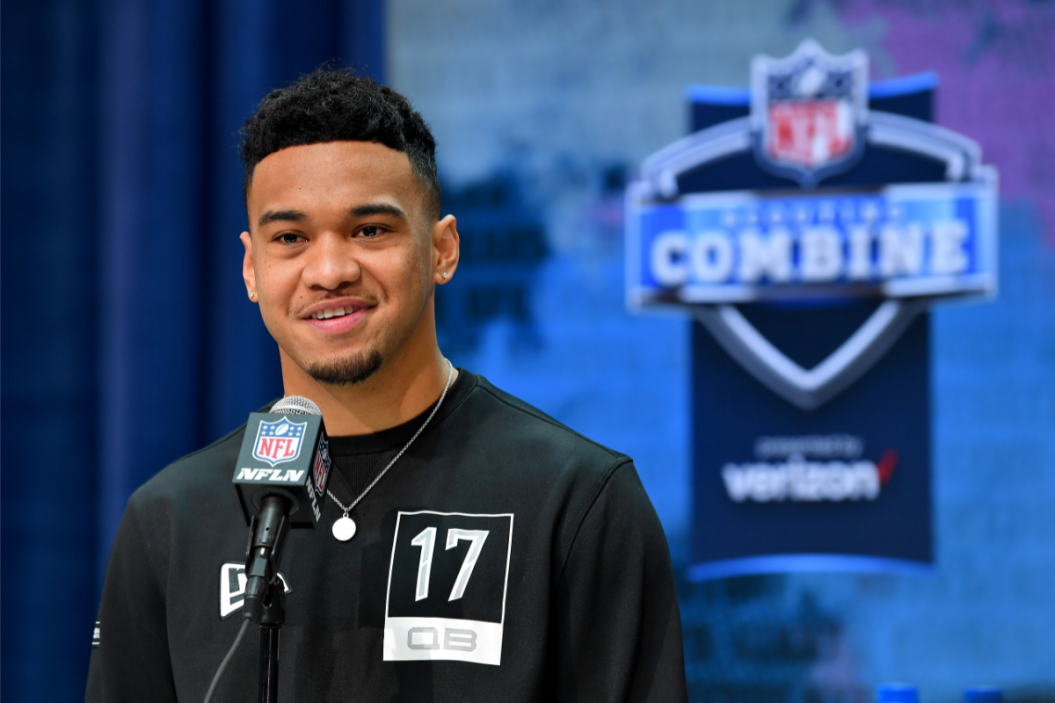Sometimes you get questions about prostitutes or tall women. Sometimes you get answers about Jamaica or all women.
Videos by FanBuzz
Either way, the annual NFL Scouting Combine makes every human resource executive in the league cringe.
A vital part of the NFL Scouting Combine, which runs this week in Indianapolis, is that teams conduct interviews with the more than 300 draft prospects who are invited each year prior to the NFL Draft in April. Inevitably, one of the standard questions from the many reporters who gather there is to ask which teams is each player interviewing with.
But what do those interviews really mean?
What NFL Combine Interviews Are Like
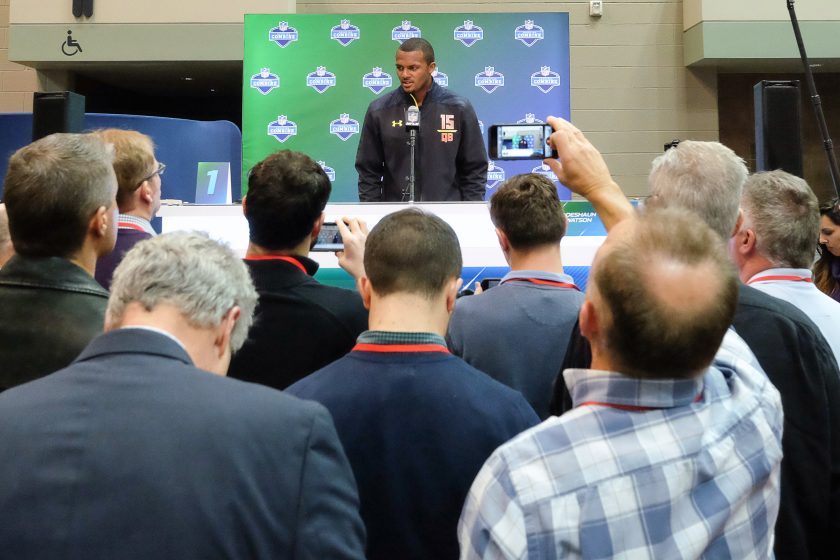
Photo by Robin Alam/Icon Sportswire via Getty Images
RELATED: Why Indianapolis Hosts the NFL Combine & How That May Change in the Future
Sometimes they are serious. Often times they are decoys. Occasionally they are used to send a message. Many times, they don't have anything to do with the player being interviewed. Most of the time, they have little to do with the substance of the answer as much as how the question is answered.
NFL teams often use the interviews to test the emotional IQ of players to see if they have the mental toughness that teams believe is necessary to handle the job. The questions sometimes get out of line, such as when players have been asked personal questions, such as whether their mother is a prostitute or if they have parents who are drug abusers or alcoholics.
That has prompted the NFL to send out annual reminders about what is off limits or not. That doesn't mean that teams don't find other ways to test players. In 2005, for instance, the Atlanta Falcons wanted to test the mental toughness of Georgia linebacker Odell Thurman, a talented-but-troubled player in college.
When Thurman walked into what he thought was going to be an interview with the Falcons (his favorite team), all but one of approximately 15 people in the room got up and left the room.
"They pretty much told me without telling me that I had to straighten up," Thurman said at the time. He didn't make a lot of progress and was out of the NFL in three years after being drafted by Cincinnati.
Sometimes, interviews are done with players to make other teams fear that the team doing the interview is interested. Sometimes, interviews are done to find out about other players.
Hall of Fame head coach Tony Dungy recalled how teams he worked for often talked to players to ask about other players.
"You might ask, 'Who are the guys from your team I'm looking for if I really want to win.' That's how we found out about guys like Bob Sanders or Dwight Freeney and what they were really like," Dungy said.
Conversely, if there are certain players that are not discussed, that's also telling.
"Players tell you a lot with every answer because they are trying to tell you everything they think you want to know. They want a job, so they don't hold back," a scout said. "If you're checking on the background of a player, most of the time they'll just tell you if they have been in trouble with the law or they have personal issues because they are told, the team is going to find out, so you're better off being honest."
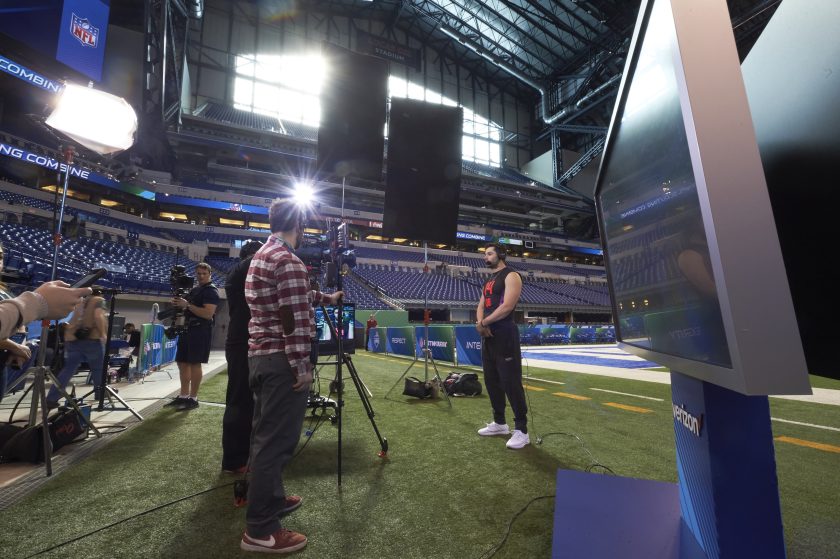
Photo by Fred Vuich /Sports Illustrated via Getty Images
There was the one time that Washington brought in defensive lineman Daryl Gardener for a private interview after the combine. The team had the No. 6 pick in the draft, was desperate for an impact defensive lineman and wanted to know more about Gardener. The interview was planned for over dinner at a high-end steakhouse.
During the interview, one of the team's executives ask Gardener a simple question: What did Gardener plan to do in the offseason. For instance, did he plan to stay and work out with the team or perhaps go back to school to finish his college degree.
Gardener leaned back in his chair, put his hands behind his head and said one word.
"Jamaica."
He then elaborated about how he planned to "chill out" on the island nation during his time away from football.
The next day, Washington traded the draft pick for a veteran defensive lineman.
Of course, a lot of discussion centers around a player's knowledge of football, particularly with quarterbacks. Coaches will ask players about specific plays or offensive system and go through classic "chalkboard" sessions to get a sense of what players know or how they think.
Still, this is primarily about getting to know the person. The combine and the related interviews are an elaborate job fair.
In fact, a lot of scouts spend little or no time watching the actual workouts. They often focus on everything going on around the workout, such as how players interact with each other or how a player works to get ready.
The small details mean almost as much as the perceived bigger issues, like how fast a player runs a 4.3 40-yard.
The Giants Even Have a 250-Question Test
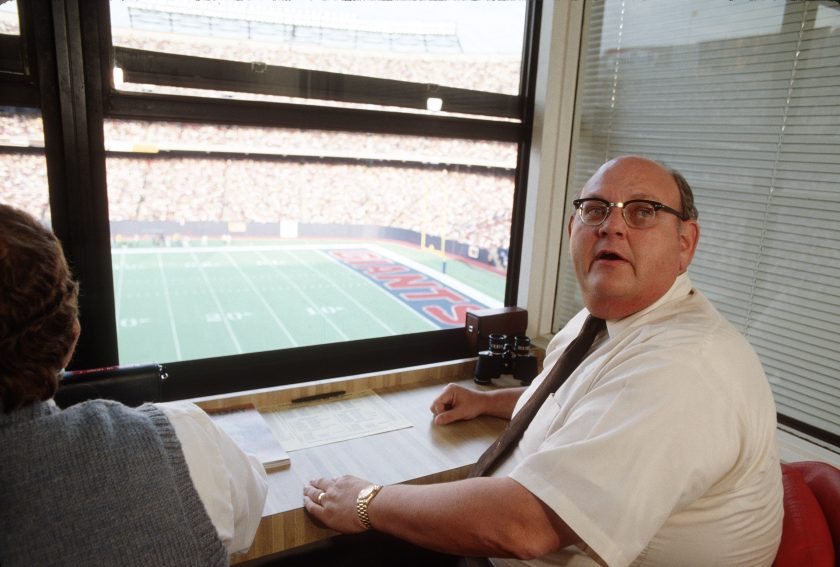
General manager George Young of the New York Giants looks on during an NFL football game circa 1993 in East Rutherford, New Jersey. Young was famous for testing players at the NFL Combine. (Photo by Focus on Sport/Getty Images)
The interview process goes beyond standard, in-person sessions. The New York Giants conduct a psychological examination that is based on answers to 250 questions, although the test used to be 434 questions. The exam was so tiring that some players refused to take it, such as wide receiver Plaxico Burress, who decided to go out drinking one night at the combine rather than take the test.
Burress was drafted by Pittsburgh, later signed with the Giants and eventually scored the game-winning touchdown in the Super Bowl on Feb. 3, 2008 against the undefeated New England Patriots.
"I was more interested in meeting Jose Cuervo than that test," Burress said years later. Burress wasn't the only one to blow off the test — Deion Sanders famously told the Giants in 1989 he didn't have time for it.
But the Giants exam did lead to one of the best responses in combine history. Linebacker Kevin Hardy, who was the No. 2 overall pick by Jacksonville in 1996, was asked to recall a typical question from the test.
"One of them was, 'Do you like tall women?'" Hardy said.
OK, what's the answer?
"I crossed out the 't' and said yes."
List of Weird NFL Combine Questions
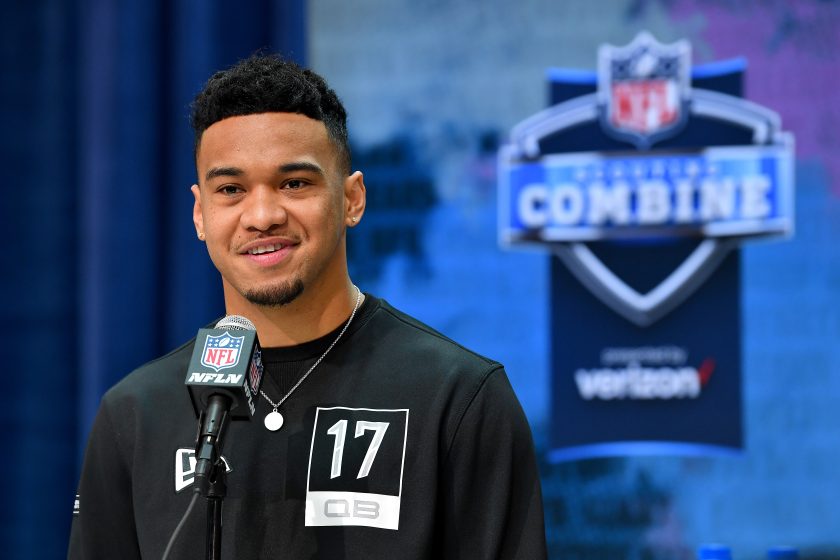
Photo by Alika Jenner/Getty Images
Below is a list of reported odd interview questions players have been asked at the combine, in addition to the "tall women" question Kevin Hardy was asked in 1996. Something tells me you'd never find these in a standard job interview.
- Do you find your mother attractive? (H/T Dane Brugler, Twitter)
- Do you like men? (Ohio State cornerback Eli Apple was asked this by a Falcons coach in 2016)
- When did you lose your virginity? (Obum Gwacham was asked this in 2015. H/T Dane Brugler, Twitter)
- Would you use a gun or a knife to murder someone? (Austen Lane was asked this in 2010)
- Is your mother a prostitute? (Dez Bryant was asked this by former Dolphins GM Jeff Ireland in 2010)
- Boxers or briefs? (Austen Lane was asked this in 2010)
- Do you wear a g-string or jockstrap when you play? (Gerald McCoy was asked this in 2010)
- Is God an Auburn fan? (Alabama running back Bo Scarbrough was asked this by a Browns coach in 2018)
- What is Bitcoin? (Miami wide receiver Braxton Berrios was asked this at the Senior Bowl in 2018)
- What is ISIS? (Miami wide receiver Braxton Berrios was asked this at the Senior Bowl in 2018)
A message to NFL coaches at the 2022 NFL Combine: please stop asking these.
